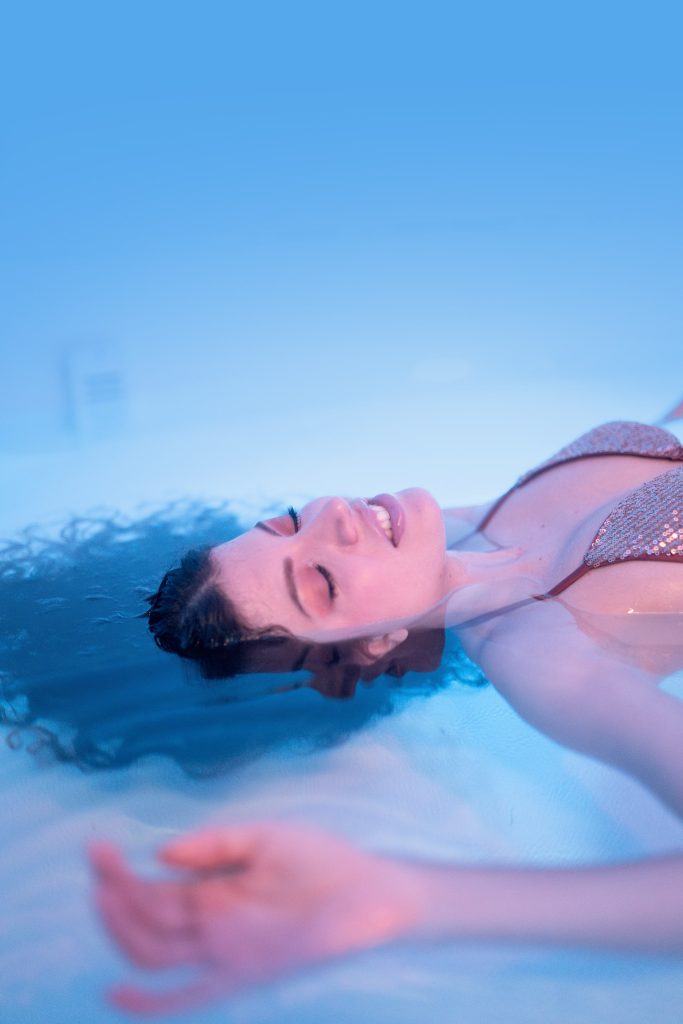The Art of Meditation in the Bath: How Hot Water Can Reduce Stress

Discover the Therapeutic Benefits of Bath-time Meditation
Imagine stepping into a sanctuary of warmth, where the stresses of the day dissolve like steam rising from a hot bath. The soothing embrace of hot water not only relaxes your muscles but also creates a perfect space to practice meditation. Engaging in this art form while submerged in water offers a unique and deeply restorative approach to stress relief, one that is often overlooked in our fast-paced lives.
Throughout history, many cultures have long recognized the therapeutic benefits of baths, from the ancient Romans who luxuriated in their public baths to the Japanese practice of *onsen* bathing. These luxurious spaces are not merely about cleanliness; they are vessels of tranquility and rejuvenation. Here are some key elements that can profoundly enhance your bathing experience:
- Essential Oils: Incorporating calming scents like lavender or eucalyptus can elevate your meditation profoundly. Studies have shown that essential oils can decrease anxiety levels and promote feelings of tranquility. Consider adding a few drops to your bath or using an oil diffuser to saturate the air with calming fragrances.
- Sensory Elements: Consider candles, soft music, or even a gentle water fountain. Dimmed lighting, coupled with subtle sounds of nature or soft instrumental music, can set the mood for deeper relaxation. As you immerse yourself in this sensory-rich environment, your mind is gently coaxed into a more restful state.
- Mindfulness Techniques: Focus on your breath or visualize calming imagery to enhance your experience. Picture a peaceful landscape or envision the waves of the ocean lapping gently at the shore. By channeling your thoughts in this manner, meditation becomes a gateway to emotional healing.
The practice of meditation in a bath not only benefits your mind but also your body. Research indicates that hot baths can improve circulation, reduce muscle tension, and even lower levels of stress hormones, such as cortisol. The warm water enveloping your body mimics the comforting embrace of a hug, allowing you to feel more at ease. This creates an ideal environment for mindfulness, where you can reconnect with your inner self in a tranquil setting.
As we delve deeper into this fascinating intersection of relaxation and meditation, you will uncover techniques and insights that can transform your bathing ritual into a powerful self-care practice. By embracing these elements, you’ll not only cultivate a serene atmosphere but also foster an enriched meditation practice that nurtures both your body and mind. Ultimately, you will be better equipped to harness the transformative benefits of hot water and mindfulness in your everyday life, paving the way for overall well-being.
DISCOVER MORE: Click here to dive deeper

Creating Your Ideal Bath-time Meditation Space
The ambiance you cultivate during your bath can profoundly influence the effectiveness of your meditation practice. Consider this space as your personal oasis where stress and anxiety can wash away. Here are several techniques that can help you design the ultimate environment for meditative bathing:
- Temperature Control: Water temperature plays a crucial role in relaxation. Aim for a comforting warmth that induces a state of bliss without becoming uncomfortable. A temperature between 100°F and 104°F is generally recommended as it aids in muscle relaxation while preventing overheating.
- Natural Elements: Incorporating nature into your bathing space can heighten the experience. Consider adding plants, such as bamboo or peace lilies, which not only purify the air but bring a touch of tranquility. A few stones or crystals can also serve as grounding elements that enhance your connection to nature.
- Comfortable Textiles: Soft towels, plush bath mats, and cozy robes can add layers of comfort before and after your soak. Investing in high-quality, soft materials enhances the overall experience and makes relaxation more attainable.
While preparing your space is essential, it’s equally important to understand the mental aspects of meditation in the bath. The transition into this meditative state can be tricky, but with a few practices, you can unlock a deeper level of peace.
Breath Awareness and Visualizations
One of the simplest yet most effective methods of meditation is to focus on your breath. As you sink into the warm water, take a moment to draw your attention to your inhalation and exhalation. Inhale deeply through your nose, feeling your lungs expand, and then exhale slowly, allowing your body to soften into the water. Incorporating this breath awareness helps anchor your mind, pulling it away from the distractions of daily life.
Another approach is mental visualization. Create an image in your mind that speaks to you, whether it’s the stillness of a serene lake or the rhythmic ebb and flow of ocean waves. With each breath, visualize the water morphing into that scene, letting the surrounding warmth envelop you in a cocoon of tranquility. This technique not only deepens your meditation but also skills your capacity to navigate stress more adeptly.
As you engage with your surroundings and immerse yourself in your meditation, even a brief session in the bath can yield significant benefits. This mindful approach encourages relaxation, mitigates muscle tension, and lowers cortisol levels, ultimately leading to a more balanced emotional state. Such practices not only enhance your meditation capability but also contribute to a lifestyle centered on self-care and wellness.
In the following sections, we will explore additional techniques and tips that can further enrich your bath-time meditation, providing insights that will empower you to cultivate a stress-free, more mindful existence.
The experience of taking a bath transcends mere hygiene; it is a holistic ritual that promotes physical and mental well-being. Hot water has been widely recognized for its soothing properties, making it an ideal medium for relaxation and stress relief. The warm embrace of water allows the body’s muscles to unwind, effectively alleviating tension accumulated through daily stresses. This physiological response opens the door to profound mental benefits.One of the most significant advantages of bathing is its ability to encourage a meditative state. As you immerse yourself in hot water, the outside world fades away, and a serene environment takes its place. This tranquility invites you to focus inward, fostering mindfulness and self-awareness. Studies indicate that engaging in mindful practices, such as meditation in the bath, can lead to reduced anxiety and improved emotional health. Furthermore, the gentle buoyancy of water helps individuals let go of their physical burdens, making it easier to slip into a meditative mindset.Additionally, this practice connects deeply with the principles of self-care. In a society that often prioritizes productivity over personal well-being, carving out time for a warm bath can serve as a powerful reminder to value one’s health. Research suggests that even short sessions in hot water can increase serotonin levels, the neurotransmitter known for its mood-lifting properties. As your body absorbs the warmth, the mind can engage in positive affirmations or simply embrace stillness, both of which can dramatically enhance the bathing experience.Furthermore, adding elements such as essential oils or calming music can amplify these effects. Many cultures around the globe integrate such practices into their bathing rituals. For example, the Japanese tradition of “ofuro” emphasizes the therapeutic potential of soaking in hot water, encouraging a meditative approach that transforms the bath into a sanctuary for the mind and soul.As we delve deeper into the art of meditation in the bath, it becomes increasingly clear that this practice is not just a momentary escape but a key to unlocking emotional resilience. So, whether you are seeking a break from daily chaos or a deeper connection with your inner self, the art of bathing invites you to experience a world of tranquility, allowing the stress to dissipate, much like steam rising from the surface of the water.
DISCOVER MORE: Click here to enhance your gratitude practice
Exploring Additional Techniques for Bath-time Meditation
Once you’ve established your serene bathing environment and engaged with breath awareness and visualization techniques, there’s a world of additional practices to explore. Each method not only enriches your experience but also elevates your stress-reducing efforts in the comforting embrace of hot water.
Incorporating Aromatherapy
Aromatherapy can significantly enhance your bath-time meditation by appealing to the senses. The inhalation of essential oils can influence your emotional state and overall sense of well-being. Consider adding a few drops of lavender oil, known for its calming properties, or eucalyptus, which can invigorate the mind and clear breathing pathways. Chamomile is another excellent choice, offering a soothing scent that might prepare you for a restful night’s sleep.
For optimal results, mix these oils with a carrier oil before adding them to your bath. This method ensures that the oils are well-dispersed and do not irritate the skin. As the fragrant steam rises, allow the scents to envelop you, drawing your mind deeper into a meditative state.
Mindful Movement and Stretching
Integrating gentle movements or stretching while soaking can enhance both physical and mental relaxation. As you sit in the warm water, take a moment to stretch your arms and legs. Simple movements such as rolling your shoulders, flexing your wrists, or gently bending forward can increase circulation and release built-up tension in the body.
This mindful movement aligns with the bath’s warm temperatures, soothing muscles and providing an added layer of relaxation. Pair these gentle stretches with your breath awareness to deepen the mind-body connection and quiet your thoughts further.
Sound Scapes and Music
Sound plays a crucial role in meditation and relaxation. Consider creating a custom playlist featuring calming music, nature sounds, or soundscapes designed specifically for meditation. The gentle sound of rain, ocean waves, or soft instrumental music can enhance your bath-time experience, making it become a sanctuary away from the external chaos of life.
Alternatively, try listening to guided meditations specially tailored for bath-time practices. These recordings often feature soft voices leading you through reflections and visualizations, integrating your experience with calming affirmations to ease stress and anxiety.
Mindfulness and Gratitude Journaling
As you settle into your meditation, take advantage of a waterproof journal or notepad to jot down thoughts as they come to mind. This process can be particularly therapeutic, allowing you to express feelings or insights that arise during your reflective time in the water.
Focusing on gratitude can be particularly beneficial. List at least three things you’re grateful for in that moment; this practice shifts your mind away from stressors and towards positive affirmations. It can create a sense of connection to the present and foster a deeper feeling of contentment.
Incorporating these practices into your bath-time meditation ritual not only amplifies the stress-reducing effects of warm water but also encourages a deeper appreciation for self-care. As you continue to refine your techniques, embrace the journey of relaxation and personal growth that bath-time meditation offers.
DISCOVER MORE: Click here for mindfulness tips
Conclusion: Embracing Serenity in Your Bath-time Ritual
In conclusion, the art of meditation in the bath emerges as a powerful antidote to the stressors of modern life. By combining the soothing properties of hot water with mindful practices such as aromatherapy, gentle stretching, and calming soundscapes, you create a unique oasis where relaxation and renewal flourish. This ritual not only calms the body but also nurtures the mind, transforming a simple bath into a potent sanctuary for reflection and healing.
Emphasizing self-care through bath-time meditation fosters a deeper connection with ourselves. It encourages us to embrace moments of stillness and cultivate gratitude, reminding us to appreciate both the present and the small joys that life offers. As you engage in these practices, let each tub soak become an opportunity for personal growth and self-awareness.
As science continues to back the benefits of mindful bathing, it becomes increasingly clear that this form of meditation may not merely be a leisurely indulgence, but a vital practice for maintaining our mental health in a world that often demands too much of us. By exploring and integrating these techniques within your bathing routine, you open the door to a transformative experience — one that embraces tranquility, heightens mindfulness, and ultimately leads to a more balanced life. So the next time you step into your tub, remember to take a deep breath, soak in the warmth, and let the art of meditation wash over you.



